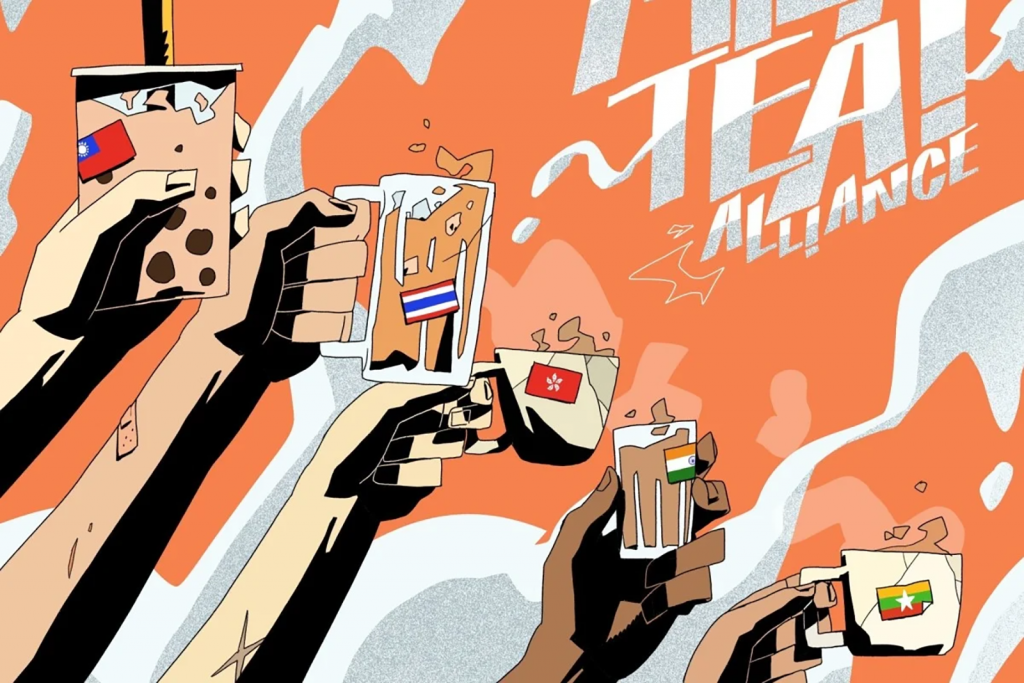In an increasingly globalised and digital world, national borders are no longer constraints on political mobilisation, argue Joakim Kreutz and Anthi Antonia Makrogianni. Thailand's 2020 #MilkTeaAlliance protests show how shared identities created in online communities can form in reaction to online repression
All politics is local, as the saying goes. But this hardly holds true for today’s globalised world. Consequences of the violence in Israel and Gaza since October 2023, from armed confrontations to mass demonstrations, have been felt across the world.
Transnational social movements including the Arab Spring, the Color Revolutions, and the Umbrella Movements are becoming ubiquitous in the digital age. Indeed, our recent PRX article argues that a new type of transnational social movement is currently emerging, which we call 'glocal' coalition movements.
What is special about this type of social movement is that its demands are developed at the local level but protest participation and – crucially – the recruitment base is transnational with a perceived shared identity. Glocal coalition movements do not form primarily around specific political demands nor a shared ideology. Rather, they mobilise following identity activation within a transnational community. Within this type, our research focuses on movements in which this identity has been activated in response to censorship and repression.
'Glocal' coalition movements develop locally but recruit transnationally, among protesters with a perceived shared identity
Prime examples of such a movement are the 2020–21 protests in Thailand, which attracted the #MilkTeaAlliance moniker. The movement focused on Thai-specific political issues, including the dissolution of the Future Forward Party (FFP), military involvement in politics, and Royal privileges. However, it drew its participants, who contributed resources and support, from Hong Kong, Taiwan, South Korea, and beyond. No similar transnational collaboration had emerged from previous Thai social movements, so the Milk Tea Alliance protests provide an interesting contrast.
The initial wave of protests followed a ruling by the Constitutional Court that FFP had to dissolve. Having formed only two years earlier, the party had grown swiftly to become the third largest in the 2019 elections. FFP drew much of its support from Thailand's youth, who saw FFP's dissolution as an attempt by the military to prevent full democratisation of the country. At high schools and universities across Thailand, students mobilised online and on the streets. Earlier protests in Hong Kong inspired protesters' symbolism and tactics.
The government responded with an emergency decree banning public gatherings (justified to prevent Covid-19) and a crackdown on online activism. Prime Minister General Prayuth declared his government would prosecute all 'abuse of social media'. His actions provoked widespread criticism, and in subsequent months, online opposition to the regime intensified. In a related development, online debate around the status of Taiwan sparked the formation of a transnational community that interacted mainly via social media.
In April 2020, an Instagram post by the girlfriend of Thai television actor Vachirawit Chiva-aree referred to Taiwan as 'a different country from China'. The post prompted 1.4 million responses on Chinese social media platform Weibo, demanding the actor apologise. Thai fans of Vachirawit, who found willing allies in Hong Kong and Taiwan, reacted angrily. Online exchanges in the aftermath of this spat led to the birth of the social media hashtag #MilkTeaAlliance. The term is born from the cultural similarity (albeit with local specifics) about the preference of people in these regions for tea with milk.

As anti-Chinese views trended, so did #MilkTeaAlliance. During a new wave of street protests in Thailand in July, the hashtag re-emerged.
In June 2020, the government lifted public gathering restrictions. At the same time, news emerged that exiled Thai online activists were being abducted in neighbouring countries, suggesting that repression knew no borders. In response, Thai anti-government activists remobilised.
In response to protests, the Thai government increased digital surveillance, made mass arrests, and filed lawsuits against social media platforms to limit freedom of expression
The response was an even more pronounced online crackdown. Thailand's government instigated a massive disinformation campaign to discredit the opposition, including creating tens of thousands of fake accounts on Twitter and messenger services. It increased digital surveillance, made mass arrests, and filed lawsuits against social media content and platforms to limit freedom of expression. In the subsequent months, the government blocked more than 2,200 websites and online accounts and it investigated more than 500,000 pro-democracy social media posts for possible criminal prosecution.
This intense attack on online communities fostered a shared identity among activists across the region. Protesters in Taipei and Hong Kong took to the streets to demonstrate in support of the Thai activists. Discussion of the protests among fans of prominent South Korean K-pop artists, meanwhile, led to funding initiatives that paid detained protesters' legal costs. Hong Kong activists criticised the Thai monarchy, while their Thai counterparts focused on the Chinese rule of Hong Kong – and this made it difficult for the respective governments to repress such claims. The #MilkTeaAlliance moniker, and transnational activism, subsequently spread to countries including Myanmar, Laos, Indonesia, and the Philippines.
Thailand's #MilkTeaAlliance movement eventually spread as far afield as Myanmar, Laos, Indonesia, and the Philippines
We can best classify this movement as a coalition of activists pursuing somewhat interlinked aims – within Thailand and beyond. Its unifying factor is that participants are socially connected by membership of online communities that are identity-centred rather than political. Government attempts to disrupt these communities are local. But the membership base is transnational, which leads to glocal political mobilisation.
Thailand's #MilkTeaAlliance shows that new forms of transnational activism may become increasingly normal in our interconnected world. However, specific conditions, such as the importance of online interaction during Covid restrictions, and the shared opposition to Chinese influence, may have contributed to the unique temporal and geographic setting of this particular example.
What is clear is that contemporary social movements are increasingly multifaceted, and the use of online expression and repression means that our understanding of mobilisation processes needs constant updating.